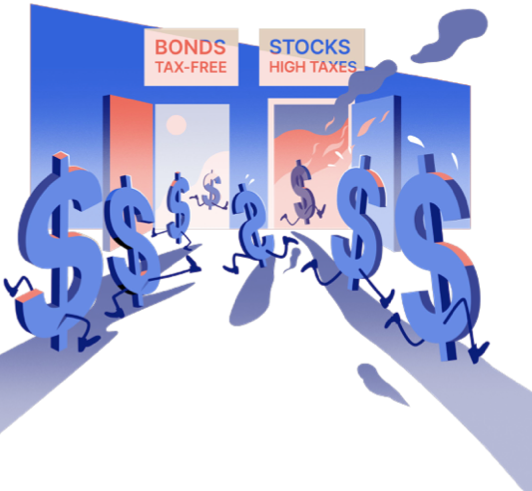The end of the road - shocking forecasts of Saxo Bank for 2024
The peaceful path the world has traveled since the Great Financial Crisis, with stable geopolitics, low inflation and low interest rates, has been disrupted during the pandemic years, with policymakers and investors betting on a return to the "old normal". In 2024, it becomes clear that the smooth road is coming to an end, sending the world into a dangerously uncertain future.
Our Shocking Predictions for 2024 are about how the world will cope with the final end of the "old normality" and how new technologies solve old problems while also creating new, perhaps more dangerous dilemmas.
With oil at $150, the Saudis are buying the Champions League brand
Ole Hansen & Kim Cramer Larsson

Emboldened by rising oil prices, Saudi Arabia is making a splash internationally by creating the World Champions League after successfully purchasing the UEFA Champions League brand. Radical restructuring of the Saudi Arabian economy, consisting of: becoming independent from oil revenues and transforming into a tourism, recreation and entertainment powerhouse, is gaining an additional boost from the sharp rise in oil prices, which reach $150 a barrel around mid-year. This is thanks to stronger than expected demand as the green transition begins to falter due to rising costs and after OPEC +, led by Saudi Arabia, maintains a firm grip on supply.
In recent years, Saudi Crown Prince Mohammed bin Salman, a renowned soccer enthusiast, has overseen the modernization of the Saudi Pro League, focusing on improving on-field performance through acquiring world-class playersto become one of the top 10 football leagues in the world. However, with oil revenues rising, MBS sees a golden opportunity to go one step further and, with FIFA's support, the Kingdom is launching a successful attempt to purchase the UEFA Champions League, one of the most prestigious football tournaments in the world.
With the keys to the esteemed soccer competition, the Saudis are immediately moving to turn it into the global club competition that FIFA, despite offering $150 million in prize money, has already tried to establish. She failed due to resistance UEFA and the European Club Association, as well as the largest clubs in Europe, fearing the risk of players overtiring. However, with the Saudi takeover, the new offer reaches a level where the big clubs cannot refuse, especially after offering money to all 220 leading clubs under the umbrella of the European Club Association.
The FIFA World Champions League is becoming a reality, with a significant number of matches being played in Riyadh. The new competition consists of 48 teams, with European clubs, as in the current UEFA Champions League format, guaranteed 32 places, Asia/Middle East, Africa and the Americas each receiving five places in the tournament, and the rest going to Oceania.
Impact on the market: Manchester United's share price doubles and the price of Brent crude oil rises to $150 per barrel.
The world is facing a major health crisis as obesity drugs cause people to stop exercising
Charu Chanana & Peter Garnry

GLP-1 obesity drugs are seen as solving the global obesity epidemic, but the ease of taking pills causes people to stop exercising and increase their consumption of fast food. Because the supply of GLP-1 will not meet demand in 2024, global rates of obesity and related health problems will increase, leading to lower global productivity.
The obesity miracle drug GLP-1 took everyone around the world by surprise, but most importantly, its promise to fight obesity caused a surge in demand the likes of which the pharmaceutical industry had never seen before. The GLP-1 medicines market is expected to reach USD 71 billion in 2032, and expectations for rapid growth and profitability have already made Novo Nordisk the most valuable European listed company. Recently, two studies have shown that the drug GLP-1 also reduces the risk of heart disease and limits the progression of kidney problems in people with chronic kidney disease.
As supply increases GLP-1 obesity drugs, their prices fall and governments decide to recognize them as crucial to improving health and stopping the obesity epidemic. The rationale is that by combating the obesity epidemic, governments can reduce costs in other areas of the health care system because overall health will improve and obesity-related secondary diseases will be reduced, thereby increasing global productivity. These widespread benefits suggest that their inclusion in insurance may be likely, which would mean a significant increase in demand.
However, it may happen that the supply of GLP-1 obesity drugs cannot meet widespread demand, and patients must wait years for injections. In the meantime, they stop exercising or following a healthy diet now the pill can keep your weight in check, fueling a serious health crisis. Global adult obesity rates will increase from 39% today to 45% in 2024, bringing a host of other side effects such as an increase in diabetes and even a sharp increase in heart disease, more injuries due to reduced muscle strength and an overall reduction in the efficiency of the system immune system. The increased number of illnesses and sick days causes global productivity to decline.
Impact on the market: The processed food industry is seeing significant growth in demand, with McDonalds and Coca-Cola share prices outperforming the markets by 60%.
The end of capitalism in the USA
Althea Spinozzi

The U.S. government is forced to sharply increase fiscal spending ahead of the 2024 elections to sustain the economy and avoid social unrest. Due to persistent inflationary pressures and the repatriation of capital by foreign investors, demand for US treasury bonds remains weak, causing their yields to increase. In a desperate attempt to normalize borrowing costs, the U.S. government exempts revenues from Treasury bonds from tax.
An increasingly uncertain geopolitical environment is forcing the U.S. government to increase defense spending, as the Federal Reserve continues to tighten financial conditions in the face of a second wave of inflation. To avoid civil unrest, Congress is forced to increase fiscal spending.
With the budget deficit rapidly rising above 10% of GDP, a level that has only been exceeded during World War II and the coronavirus pandemic in the last hundred years, the government must urgently increase demand for US Treasuries. Attention is turning to the stock market, where the "Magnificent Seven" have now become the twelve, thanks to a missed slowdown and government support programs addressed to lenders and home owners. Eli Lilly, Novo Nordisk, Visa, join the club JPMorgan Chase, LVMH, ASML and TSMC. As the Twelve Titans multiply their valuations in a matter of months, the inequality between investors and non-investors increases.
The U.S. government understands that political stability depends on its ability to continue financing its massive deficit through greater issuance of Treasury bonds and therefore lower interest rates. Therefore, it becomes crucial to increase the domestic attractiveness of US Treasuries compared to stocks. Under intense pressure from the White House, Congress exempted capital gains and interest on U.S. Treasury bonds from tax. When public debt is in the hands of domestic investors, the cost of financing becomes less volatile.
This dramatic move marks the end of capitalism as money flows from private corporations to the public and riskier assets become more expensive to own. Counterintuitively, the "Twelve Titans" are consolidating their market dominance because they are benefiting from long-term lower financing costs while the rest of the stock market is collapsing. Despite the government's failure to address inequality, lower borrowing costs calm social unrest. There follows a long period of nationalization and government intervention in critical sectors that are struggling to attract capital.
Impact on the market: U.S. Treasuries are rising in value in all periods and the yield curve is flattening as investors can lock in the highest yields in decades without the tax burden. The stock market is falling, but a select group of cash-rich companies are benefiting from an inverted yield curve.
Generative deepfake AI is causing a national security crisis
Peter potter

Generative AI, hailed as a productivity boon, becomes a threat to national security following a daring deepfake AI attack on a high-ranking official in a developed country. Governments are cracking down on AI with new regulations, cutting through the AI hype, while VCs are fleeing the industry. Public distrust of AI-generated news is growing, and governments are imposing new regulations, allowing only a small group of entities to disseminate public news.
While everyone from McKinsey to the corporate sector and leading economists see generative AI as a great productivity tool that will accelerate growth in the coming decades, others see it as a potential new weapon. In a high-stakes game, a criminal group deploys the most deceptive deepfake generative artificial intelligence the world has ever seen, tricking a high-ranking government official in a developed country into handing over top-secret information. The bold move and success trigger the worst national security crisis since World War II, ushering in a new era of far-reaching regulation of artificial intelligence.
In a historic move to address the disastrous side effects of generative AI, the US and EU declare that all content created by generative AI should be labeled "Made by AI" and failure to comply will result in severe punishment. An even bigger blow to generative AI is that the government is forcing it OpenAI and Google to Restricting third party access to their underlying large language models for national security reasons, which means that only government-approved entities can use these new generative artificial intelligence systems. The new regulation kills the buzz around generative AI as Venture Capital investments dry up amid concerns that generative AI will be harder to commercialize.
The deepfake generative AI incident is moving from a national security crisis to a complete public distrust of information available on the internet as the percentage of AI-generated content grows to 90% of all information. In all developed countries, governments are introducing strict regulations that only government-approved news organizations can disseminate news to the public, which is a big blow to social media platforms and "non-compliant" news organizations. The "know your customers" regulation, well known in the banking sector and intended to avoid money laundering, is being forced on technology companies providing generative AI applications, to avoid access to this technology by certain countries and entities.
Impact on the market: Traditional media companies approved by their governments to disseminate public news skyrocket in value, with the stock price of The New York Times Company doubling. Adobe shares are falling after the government punished the company because a disastrous deepfake was made using their software.
Deficit countries form a "Club of Rome" to negotiate trade terms
Steven Jakobsen

The persistent and widening current account divergence between surplus and deficit countries is the result of currency management and is unsustainable in the long run. As the United States' debt situation has become uncontrollable, a group of six deficit countries are forming the "Club of Rome" to work together to reduce their deficits by jointly negotiating new world trade terms with surplus countries. We believe that gold silver and cryptocurrencies will do very well in an unpredictable environment for the world's reserve currency and unsustainable current accounts of deficit countries.
The "Club of Rome" is formed for the purpose reducing the current account deficit of the group of high-deficit countries. Theoretically, an open and free economy is managed and self-regulated through currency adjustments, in which deficit countries devalue their currencies to restore competitiveness. In fact, many, if not almost all, countries control their currencies and thus run either permanent deficits or surpluses. We simply have a partially fixed global monetary system, which makes the whole concept of free trade difficult, and there is no way for the WTO to find a middle ground to reduce the burden of ever-increasing deficits in some countries. This will lead to the creation of the "Club of Rome", a cooperation aimed at fixing the ever-growing divergences in the global trade and financial system.
In 2024, facing a severe global recession and limited tools to reduce interest rates due to persistently high inflation, the world's largest deficit countries meet in Rome to establish better conditions for structurally limiting their ability to further increase surpluses. It is argued that resetting deficits through a gradual revaluation of surplus countries would enable a global reset, creating a more equal and stable economic model. The six founding countries "Club of Rome” are the United States, the United Kingdom, India, Brazil, Canada and France. Adjusting current account divergences between key countries will be painful for the countries with the highest surpluses, which are China, Germany, Norway, Japan, the Netherlands and Singapore.
The fact that US debt is out of control in 2022 is a key catalyst here. When the Club of Paris, the official lenders' club, was formed in 1956, the total debt of the United States was 273 billion, but fast forward to the present and the debt balance is USD 33 trillion, a whopping 14% increase.
Impact on the market: The fact that the world's reserve currency is getting out of control, reduces faith in the fiat money system, providing big profits for gold, silver and cryptocurrencies.
Robert F. Kennedy Jr wins the 2024 US presidential election.
John Hardy

In 2024, for the first time in US history, a third-party candidate, Robert F. Kennedy Jr., wins the presidential election. His populist platform against warmongering Democrats and corporate elites resonates with both disaffected traditional Democrats and Trump supporters. A new political era in the US begins with a dramatic shift away from plutocracy as voters demand an end to drastic inequality and injustice and an end to perpetual wars.
As 2023 turns into 2024, a recession begins in America, bringing with it greater potential to change political attitudes. After four years of Trump and then four years of Biden, voter enthusiasm for geriatric candidates is waning. Biden's support continues to decline as the economy and labor market spiral downward, even as inflation remains high. Public opinion links Biden's mismanagement of the geopolitical situation in Ukraine and the Middle East with rising prices of oil, basic goods and rents. Meanwhile, Trump enjoys an enthusiastic political base, but his narcissistic attitude and erratic behavior are causing the ranks of his staunch supporters to dwindle.
Observers note remarkable similarities with Robert F. Kennedy Sr.'s campaign for peace in the 1968 election, when his popularity soared as he sought to win the Democratic nomination before his campaign was interrupted by an assassin's bullet. RFK Jr's anti-establishment stance mirrors the efforts of his uncle, John F. Kennedy.
Before the early recession in 2024, RFK Jr didn't even seem like a dark horse to win the 2024 election, with polls showing about 15% of voters supporting him. But as the United States goes through a recession this spring and summer, his support in the polls continues to grow. Dissatisfaction with incumbent Democrats is rising to a fever pitch. Meanwhile, Kennedy's populist and isolationist message also appeals to less affluent Trump voters, and both parties may join the RFK Jr movement as his "third way" disrupts the old psychology of being either passionately for or against one of the traditional two parties.
On Election Day, November 5, Kennedy wins the US presidential election with 38% of the popular vote, with Biden and Trump splitting the rest almost evenly. The Electoral College victory is surprisingly dominant because Kennedy has the best polls in most areas that previously voted for Trump. A new era in American politics begins as Congress is shaken to its core, eliminating previous dysfunctions, while Kennedy is able to build bipartisan coalitions.
Impact on the market: Kennedy's pro-peace message and promise to end abuses of America's health care system and dismantle excessive corporate power cause stocks of defense, drug and health care companies to tumble and the Internet and IT monopolies to tremble for fear that there will be a wider war against monopoly companies.
Japan's "lucky" 7% GDP growth forces the Bank of Japan to abandon yield curve control
Charu Chanan

Japan was an economic powerhouse for many years before the bubble burst in 1991 and a long period of stagnation began. Corporate profits and wages were depressed, and an aging population meant labor shortages and declining consumption. However, with the end of deflation, rising wages and private investment, rising productivity and rapid economic growth, a new low is emerging.
The era of deflation in Japan has ended, bringing wage growth back. Spring salary negotiations in 2023 resulted in a 3,6% increase in wages, and in 2024 there may be an increase of over 4%. The fiscal stimulus from the proposed reductions in consumption tax rates will encourage Japanese consumers to move away from a savings mindset. As the current presidential term ends in September 2024, Prime Minister Kishida and his administration introduce a number of populist resolutions, which will further strengthen domestic demand.
As demand continues to grow, companies are announcing increases in capital expenditure. Ample cash reserves of Japanese companies suggest a strong appetite for this expenditure, which was also reflected in September's Tankan survey by BoJ, which saw an expected increase in capital expenditure of 13,3% in fiscal year 2023 from 7,4% growth in the previous year. Employment dynamics are also changing, with labor supply decreasing due to an aging population, while demand for health and social care continues to increase, and due to increasing domestic demand. This, in turn, translates into wage pressure, creating a positive cycle.
Japan is accelerating its economic transformation program, adopting a technology diffusion framework that helps increase productivity despite labor shortages. Global supply chains remain fluid, which benefits Japan as the trend of friend-shoring increases, resulting in greater investment. More technology companies announce investments in Japan in 2024 thanks to government support. Savings on technology costs allow the Japanese government to tackle its debt burden and continue fiscal easing to provide a lasting boost to growth, inflation and wages.
With yield curve control in place, the Japanese economy is overstimulated as real interest rates fall and nominal yields are constrained amid rising inflation expectations. The BOJ is therefore forced to end its yield curve control policy in 2024. This causes global bond markets to decline as Japanese investors move money back home.
Impact on the market: Yen strengthens as Japanese investors shift money into domestic assets, pushing USD / JPY below 130, EUR/JPY below 140 and AUD/JPY below 88.
Demand for luxury goods falls as the EU follows in the footsteps of Robin Hood by introducing a wealth tax
Peter potter

Because the EU needs more funds for various political purposes, incl mitigating the effects of climate change, health care and education, and the population realizes how little taxes billionaires pay, the European Commission is implementing a law that taxes 2% of wealth every year. The law sent shockwaves through the European luxury goods industry, with luxury giant LVMH plunging by 40%.
It is a great irony that the EU, which is the world's largest welfare system, has created 499 USD billionaires who pay the lowest amount of personal tax compared to their North American and East Asian counterparts, according to the Global Tax Evasion Report 2024. French billionaires are subject to a pre-tax income rate equal to US billionaires, even though the entire population pays an average of 46-50% in tax, violating the basic principle of reciprocity. It's even better to be a billionaire in the Netherlands because the average tax rate is lower than what billionaires pay in the US.
With civil unrest in Europe constantly on the brink of eruption and the costs associated with the green transition, the war in Ukraine and general inflation rising, the European Commission is committing to the July 2023 European Citizens' Initiative (ECI) entitled 'Taxing big wealth to finance the green and green transition social”. The European Commission implements the law that taxes 2% of the wealth of billionaires in the EU every year, recognizing the reality presented in Thomas Piketty's book Capital in the 2st Century that levels of wealth are rising faster than income. A 42% wealth tax on billionaires in the EU brings in additional tax revenues of €2021 billion, which goes towards financing climate change mitigation projects, healthcare, education and public infrastructure. In 10, total EU household financial assets in equity and investment funds were around €100 trillion, so a broader 150% wealth tax on multimillionaires could increase tax revenues to around €XNUMX-XNUMX billion.
The EU's modern version of Robin Hood is shaking up the European luxury goods industry. Recent studies have shown a strong correlation between the desire to own luxury items and the level of income and wealth inequality. The European Commission's new wealth tax immediately lowers market expectations regarding the demand for luxury goods in the future, and investors are abandoning European luxury stocks.
Impact on the market: Shares LVMH are falling by 40% due to the new wealth tax introduced by the European Commission, and other parts of the luxury segment, including Porsche and Ferrari, are significantly depreciating.
For an in-depth look at Saxo Bank's Shocking Predictions for 2024, visit Sax.






















![Forex Club – Tax 9 – Settle tax on a foreign broker [Download the Application] Forex Club - Tax 9](https://forexclub.pl/wp-content/uploads/2024/02/Forex-Club-Podatek-9-184x120.jpg?v=1709046278)
![Trading View platform – solutions tailored to the needs of traders [Review] trading view review](https://forexclub.pl/wp-content/uploads/2024/03/trading-view-recenzja-184x120.jpg?v=1709558918)
![How to connect your FP Markets account to the Trading View platform [Guide] fp markets trading view](https://forexclub.pl/wp-content/uploads/2024/02/fp-markets-trading-view-184x120.jpg?v=1708677291)
![How to invest in ChatGPT and AI? Stocks and ETFs [Guide] how to invest in chatgpt and artificial intelligence](https://forexclub.pl/wp-content/uploads/2023/02/jak-inwestowac-w-chatgpt-i-sztuczna-inteligencje-184x120.jpg?v=1676364263)


![WeWork – the anatomy of the collapse of a company valued at $47 billion [WeWork, part II] wework bankruptcy story](https://forexclub.pl/wp-content/uploads/2024/04/wework-bankructwo-historia-184x120.jpg?v=1711729561)
![Adam Neumann – the man who screwed up Softbank [WeWork, part AND] adam neumann wework](https://forexclub.pl/wp-content/uploads/2024/04/adam-neumann-wework-184x120.jpg?v=1711728724)





![How to transfer shares to another brokerage office [Procedure description] how to transfer shares to another brokerage house](https://forexclub.pl/wp-content/uploads/2024/03/jak-przeniesc-akcje-do-innego-biura-maklerskiego-184x120.jpg?v=1709556924)

![The most common mistakes of a beginner trader - Mr Yogi [VIDEO] Scalping - The most common mistakes of a beginner trader - VIDEO](https://forexclub.pl/wp-content/uploads/2024/03/Scalping-Najczestsze-bledy-poczatkujacego-tradera-VIDEO-184x120.jpg?v=1711601376)
![Learning patience: No position is also a position - Mr Yogi [VIDEO] Scalping - Learning patience - No position is also a position - VIDEO](https://forexclub.pl/wp-content/uploads/2024/03/Scalping-Nauka-cierpliwosci-Brak-pozycji-to-tez-pozycja-VIDEO-184x120.jpg?v=1710999249)
![When to exit a position and how to minimize losses - Mr Yogi [VIDEO] Scalping - When to exit a position and how to minimize losses - VIDEO](https://forexclub.pl/wp-content/uploads/2024/03/Scalping-Kiedy-wyjsc-z-pozycji-i-jak-minimalizowac-straty-VIDEO-184x120.jpg?v=1710336731)







